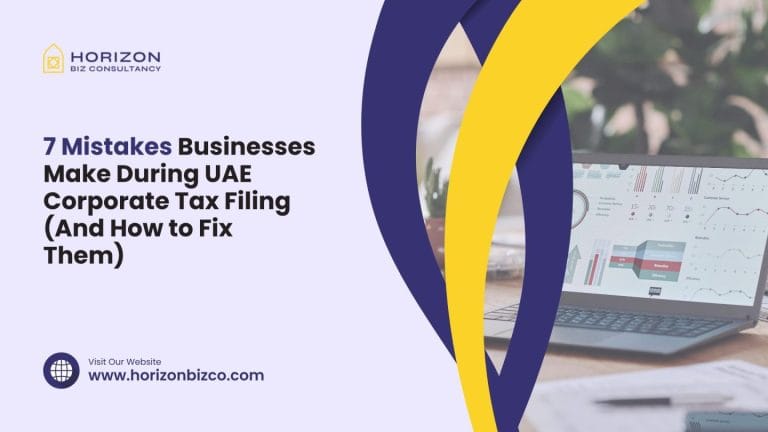Filing corporate tax in the UAE is a new experience for many businesses. Since the implementation of the corporate tax regime, several companies have unknowingly made errors that led to penalties, non-compliance warnings, or missed benefits. Understanding these mistakes early on can help you avoid trouble and keep your operations smooth and compliant.
With the UAE’s corporate tax regime now in full effect, businesses especially startups and free zone entities must navigate complex regulations to avoid costly missteps. The Federal Tax Authority (FTA) has strict penalties for errors, and even unintentional oversights can lead to audits, fines, or reputational damage. By understanding these common pitfalls early, you can streamline compliance, maximize tax efficiencies, and focus on growing your business with confidence.
1. Missing the Corporate Tax Registration Deadline
What’s the Mistake?
Many businesses are unaware that the registration deadline depends on the month their trade license was issued, not their financial year. Missing this leads to a AED 10,000 penalty.
How to Fix It:
- Check your license issuance month.
- Refer to the FTA’s registration deadline chart.
- Register via EmaraTax Portal before the applicable deadline.
The FTA may assign different registration deadlines based on your business’s licensing date. Some businesses receive an extension, while others must register immediately. Always verify your specific deadline on the EmaraTax portal to avoid penalties.
2. Assuming Exemption Without Proper Filing
What’s the Mistake?
Freelancers and small business owners earning below AED 375,000 often skip filing, assuming they’re exempt. However, you must register and claim Small Business Relief to be exempt.
How to Fix It:
- Register on EmaraTax.
- Tick the option for “Small Business Relief” in your filing form.
Note that Small Business Relief (SBR) applies only if revenue is below AED 3,000,000, while the 0% tax rate applies to taxable income up to AED 375,000. Even if you qualify for SBR, you must still submit a tax return declaring your exemption.
3. Filing With Incomplete or Incorrect Financial Records
What’s the Mistake?
Incorrect or unverified numbers in your profit & loss statement can trigger audits or rejection of returns.
How to Fix It:
- Maintain books of accounts using approved software (e.g., QuickBooks, Zoho Books).
- Get your financials reviewed by a qualified accountant.
- Reconcile income, expenses, and bank statements regularly.
Businesses with revenue exceeding AED 50,000,000 must submit audited financial statements. Using accounting software like QuickBooks helps, but ensure your records comply with IFRS
4. Ignoring Free Zone Qualifying Criteria
What’s the Mistake?
Free Zone businesses often assume they qualify for 0% tax. However, to benefit from this rate,
strict rules on Qualifying Income and Economic Substance must be followed.
How to Fix It:
- Confirm your income is from permitted activities.
- File an Economic Substance Report.
- Avoid transactions with mainland unless exempted.
Only Qualifying Free Zone Persons (QFZPs) enjoy the 0% rate. If your Free Zone business earns income from mainland UAE activities, that portion is taxed at 9%. Always verify your income classification before filing.
5. Overlooking Transfer Pricing Documentation
What’s the Mistake?
Businesses with related-party transactions fail to document transfer pricing correctly, exposing them to
penalties starting at AED 25,000.
How to Fix It:
- Identify all related-party transactions.
- Prepare a Local and Master File.
- Ensure prices are at “arm’s length” as per OECD standards.
SMEs with related-party transactions below AED 50,000,000 may have simplified reporting requirements. However, if your transactions involve cross-border payments, maintaining a Master File is advisable to avoid scrutiny..
6. Late Filing of Corporate Tax Returns
What’s the Mistake?
Returns are due 9 months after the end of your financial year. Late filing attracts penalties and affects your compliance record.
How to Fix It:
- Set up reminders 6 months in advance.
- Submit your return online via EmaraTax.
- Start preparation 3 months before deadline.
Late payments incur 14% annual interest on unpaid tax, in addition to filing penalties. Large businesses may need to make quarterly advance tax payments, so plan cash flow accordingly
7. Not Seeking Professional Help
What’s the Mistake?
Many businesses try to DIY their filing without fully understanding UAE corporate tax law. This results in
missed benefits, wrong classifications, and errors.
How to Fix It:
- Book a consultation with a corporate tax advisor.
- Use professional services for your first few filings.
The FTA offers free e-learning courses on EmaraTax for basic guidance. However, complex cases (e.g., Free Zone eligibility, transfer pricing) still require expert advice to avoid costly errors.
Conclusion:
Filing corporate tax correctly in the UAE requires knowledge, planning, and timely action. By avoiding these 7 common mistakes, you can save money, avoid penalties, and stay compliant with UAE tax law.
Staying proactive, consulting experts when needed, and double-checking all data before submission can go a long way in protecting your business.
Need help? Horizon Biz Consultancy is here to guide you through registration, filing, and compliance.
FAQ’S
Many businesses file late, skip registration, misclassify income, or fail to maintain documentation. These mistakes can result in penalties and audits.
Yes. As per the UAE Corporate Tax Law, all taxable persons must file, regardless of profit. Not filing can lead to fines.
You’ll incur a fine of AED 1,000 immediately, plus AED 1,000 for each month delayed (capped at AED 10,000), along with 14% annual interest on unpaid tax.
Yes. The FTA allows penalty reconsideration for valid reasons like system issues or financial hardship, especially for first-time offenders.
Absolutely. Non-filing can lead to the loss of 0% Qualifying Free Zone Person status.





